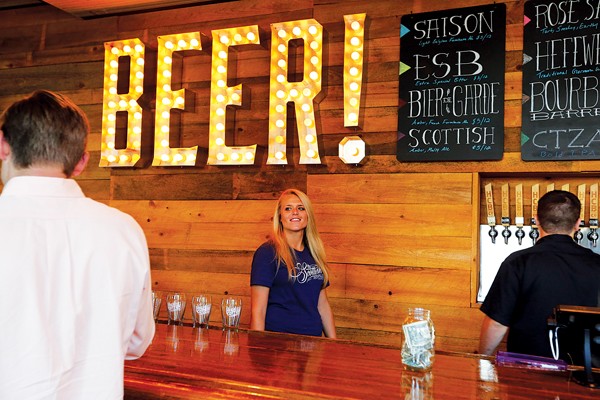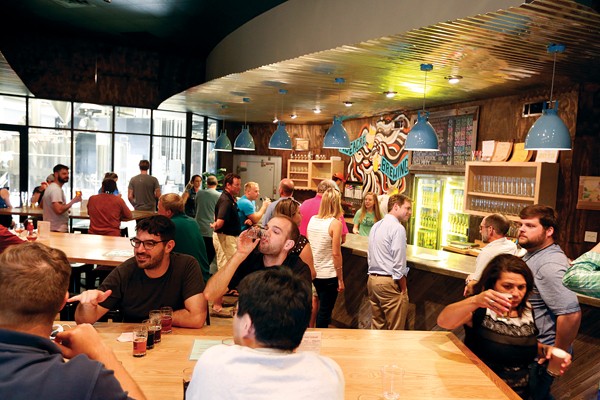Wharton helps producers prepare a tribute to constituent Dr. Craig Strickland, senior pastor of Hope Presbyterian Church.
It was an eventful 24 hours, even by Mayor A C Wharton Jr.’s standards.
A Tuesday afternoon meeting at the White House with President Barack Obama and a group of mayors. A follow-up meeting with Attorney General Eric Holder and Memphis police director Toney Armstrong. A White House reception that evening with speakers from the March on Washington in 1963. A 4 a.m. wake-up call, the early-bird flight to Memphis, a dash to the Convention Center to welcome the Memphis Minority Business Council, a ribbon-cutting and tour of a new brewery in Midtown, a meeting with interim University of Memphis president Brad Martin, remarks in front of City Hall at a ceremonial reading of Martin Luther King’s “I Have a Dream” speech, one-on-ones with CVB CEO Kevin Kane and city attorney Herman Morris, plus interviews and photo sessions.
It was enough to make a guy who turned 69 in August almost forget that his 43rd wedding anniversary was the next day.
“If I was in the legislative branch, I would pass a law that after 25 years you don’t have to buy anything,” he muttered without much conviction. There would probably be a trip to the flower shop before he called it a day.
After four years as city mayor and seven years as county mayor, Wharton can make it look easy. We have had politicians who served longer and provided more thrills and headaches (Willie Herenton), who were more gregarious (Bill Morris) and rambunctious (Wyeth Chandler), and who were better at machine politics (Harold Ford Sr.). But none of them was smoother than Wharton with his country charm, sincerity, and civility, combined with the canniness of a trial lawyer.
His attraction, and his vulnerability, is that he offers something appealing and hopeful to everyone — Memphis Tomorrow to AFSCME, bike lanes to blight, off-the-record wisecracks to thoughtful interviews, Tweets to The New York Times, five-year plans to get-right-on-its, the rich constituents of East Memphis councilman Kemp Conrad to the poor ones of North Memphis councilman Joe Brown. He dresses like a model for GQ but sprinkles his conversation with “ain’ts” and dropped g’s at the end of verbs. He travels alone. He and his wife Ruby raised six boys. For more than 40 years, they have lived in the same upscale neighborhood on South Parkway East, but they can’t get pizza delivery because they’re on the wrong side of the railroad tracks. A Roto-Rooter driver recently agreed to make a house call only when assured that he could park his truck inside the locked driveway gate.
So why hasn’t he led? Can he lead? Why does he make unforced errors? Why doesn’t he spend his political capital? Like Obama in 2008, there are great expectations, usually met by assurances. The glass is always half full. Compromise is possible. The door isn’t closed. Patience. We can work it out. A deal is in the works. The budget gets done. Memphis is not Detroit.
Driving 55 miles an hour might get you to Nashville or Atlanta, but you feel like jumping out of the car and screaming first.
“Can he say no? I’m trying to think of an example,” says Councilman Myron Lowery, who was interim mayor between Herenton and Wharton. “He will not say no directly. What he will say is, I understand what you are saying; let’s go back to the drawing board. He’s a compromiser. He’s a peacemaker. He doesn’t want to fight. At some point, you have got to make your position known and just say we differ.”
The mayor allowed the Flyer to tag along with him for a day last week that happened to follow his visit to Washington. He runs on a daily regimen of pushups, healthy eating, half-finished cups of Starbucks, and the print edition of The New York Times, but having missed both the coffee and the paper at his hotel in Washington, he was mildly irritated as he looked over his schedule:
“Someone will say, ‘Yeah Wharton, he’s up there flittin’ around in Washington, D.C., and I can’t get my weeds cut.'”
His seventh-floor corner office has a big view of the riverfront, which seemed like a good place to start.
“How can I talk about industrial opportunities on Presidents Island, which is way off in the woods down there, when so many people aren’t worried about 10 years from now. They’re worried about next month’s car note or tuition payment. And here’s this guy talkin’ down-the-road stuff. If he’d do something now and give more money to MATA, I wouldn’t have to worry about that car note. I seldom use the word stress, but there’s tension between trying to do what you know is right for the long term and balancing that with day-to-day survival. That’s what I deal with every day.
“When someone is sayin’ we gotta cut, cut, cut, I’m sayin’ we gotta grow, grow, grow, which is our ultimate salvation. I don’t need an economist to tell me the best way to grow this city is to develop Presidents Island and potentially create 5,000 new jobs.”
Wharton readily admits that his old job as county mayor was easier in many ways and offers more opportunities to pass the buck:
“This is retail, and that side of the street is more wholesale. They make sure there is funding, but the mayor doesn’t hire sheriff’s deputies or appoint the sheriff. Taxes? Sorry, trustee does that. Don’t like your appraisal? I’m sorry, I’ll put you in touch with [Assessor]Cheyenne Johnson. My job wasn’t like Mayor Herenton’s. It was easy for me to glide along. That’s why I never second-guessed his style. This is a totally different animal.
“Perhaps to a fault, I like to get real dirt under my fingernails. I was raised in the retail business, dealing with customers, which I have always loved to do. There’s nothing more gratifying to me than have a parent come up to me and say, ‘Thanks for that program’ or ‘I’m sure glad you tore down those old apartments in my neighborhood.’
“The council is competing interests. If you do something for Graceland, then what about Raleigh Springs Mall? Or if you do Overton Square, what about the Beltline? Or you closed my police precincts, why don’t you close hers? I did not have to deal with that on the county side. The closest thing was probably the agreement to build Arlington High School and Southwind High School.”
An aide knocks on the door and says it’s time to go. We drive to Broad Avenue in Midtown for the ribbon cutting at Wiseacre Brewing. Wharton says he doesn’t drink the stuff. There is a big crowd, perhaps waiting for possible samples. But the tasting room isn’t serving yet. Twelve hours after sitting in the Roosevelt Room with the president, Wharton is sweating on a plastic folding chair in the blazing sun while bankers praise a new brewery with an outdoor patio that looks like an excellent location to combine trainspotting and drinking. The founding brewing brothers, Davin and Kellan Bartosch, are sensibly wearing T-shirts and jeans or shorts and eating it up.
“This is home-grown talent showing that their dreams can come true right here in Memphis, Tennessee,” Wharton says.
Then it’s back in the car for a pit stop at Starbucks. I ask Wharton if he marched on Washington in 1963.
“I did not,” he says. “I was working part-time after my freshman year at Tennessee State in Nashville. It’s amazing that there were 250,000 people who went to Washington. Adjust that for social inflation. The march was on a Wednesday. Most of them had to go by bus, which meant leaving on a Monday or Tuesday. They probably couldn’t make it home until Friday, which meant they missed a week of work. It was one hellacious sacrifice.”
At the University of Memphis, Wharton is greeted by President Brad Martin. They are old friends who did election analysis together on WMC-TV years ago.
“He was really good at it,” Martin says. “I knew he had a future.”
For the meeting, Martin is dressed casually, but Wharton doesn’t even shed his coat. The subject is “talent retention,” which is a pet project of Wharton’s new Office of Talent and Human Capital. The university has lower enrollment this year than in 2009. Of the school’s graduates, 38 percent stay in Memphis and 78 percent stay in the metro area, which doesn’t seem so bad, but no one brings that up. Martin envisions imitating the Teach For America model for students in the College of Education, with a goal of 4,000 future teachers, all of them honor students.
Wharton has a polite caveat, noting that TFA alumni often move on after two or three years.
“I would much rather have them come to Shelby County and work their way up through the classroom and administration and stay here,” he says.
Martin also puts out the idea of an all-optional Shelby County Schools high school on the university campus, with philanthropic backing, that would feed into the college of education. One other idea that comes out is a city/county/university welcome reception for new faculty and staff to make them feel as appreciated as Electrolux employees, the gold standard for new jobs. This is not exactly outside-the-box stuff, given that Wharton and former U of M president Shirley Raines overlapped by a decade, but everyone agrees it should happen soon.
We head for lunch at the Piccadilly Cafeteria on Poplar. Wharton hates to eat takeout because he finds it “gross” and enjoys the opportunity to meet people and glad-hand in restaurants. Getting out and about, he says, is often how he gets his ideas and avoids burnout:
“Flying over the intersection of Lamar and Pendleton, I said to myself that’s horrible. And I live not too far from there. People were always complaining about that death trap out there. I look down and say to myself, damn, you’re the damn mayor, why don’t you do something about it? I’m never satisfied. I always think we can do something a little bit better.
“Problems are in the DNA of cities. Cities were formed by folks who couldn’t make it unless they worked together. Counties were laid out by the legislature. I expect a bunch of challenges every day. I never expect an easy day.”
I suggest that Nashville is a more governable city, and he nods enthusiastically.
“I am glad you said it, not me. If I had an alternative, I would never do a PILOT. But what’s the alternative? Folks say you’re not puttin’ any money in schools. Well, where do you get the money? Property taxes. How do you get it to increase in value? Well, people buy homes. Well, how do they buy homes? They get a job. How do they get a job? Well, maybe because Electrolux comes to Memphis. You take a small victory whenever you can. I thought about Nashville this morning. You’re absolutely right. Race, income, and geography makes it more difficult here.”
Back at City Hall, we run into Lowery after the March on Washington ceremony.
“His relations with the council are sometimes strained because there is an opinion of some on the council that A C is constantly campaigning and wants the credit,” Lowery says. “The council realizes that nothing can be done by the mayor himself but must be done in partnership. Things happen sometimes which cause us to delay, like last week’s sanitation vote. The day before the meeting the mayor signed a compact with AFSCME saying what we were going to do, subject to council approval. One member specifically said A C wants to do this because the 50th anniversary of the march was going to get a lot of national publicity and he’s going to frame the story with the sanitation workers. There was a little bit of jealousy with that.
“On the budget, it doesn’t matter what the mayor gives us for a budget. The only thing that matters is what we do. Several members insist on sending the budget back to the mayor to make him come back with a more conservative budget. And A C did that. Had I been mayor, I would have told the council members they have the ultimate authority, so don’t make me second-guess myself. I remember one year Dr. Herenton sent us a budget with a 50-cent tax increase and followed it with a note that said, ‘Pass the damn budget or not. I’m not playing games.’ That was his style. A C has a laid-back, country style that people like, but there is skepticism on the council.”
Wharton has heard this many times before and does not dispute it.
“There’s tension, but on major issues, we iron out our differences and come up with something,” he says, back in his office. “There is one of me and 13 of them, and many of them want to hear directly from me. It might not be the prettiest budget, but we get it done. That’s the ultimate measure. Do you get it done?”
Scuttlebutt, he insists, doesn’t bother him.
“I know how to do Twitter and Facebook, but you find folks who are readin’ all that stuff, it will drive you crazy. When you are out as much as I am, I would much prefer to talk to people face to face and let them chew me out if they want to. That’s my game. Maybe I’m a dying breed.”
It is after 6 p.m. and A C Wharton hasn’t been home in nearly three days. And he still doesn’t have anything for his anniversary.


 Justin Fox Burks
Justin Fox Burks  Justin Fox Burks
Justin Fox Burks